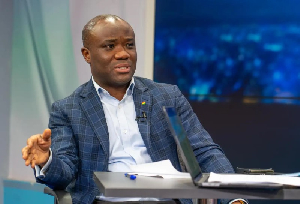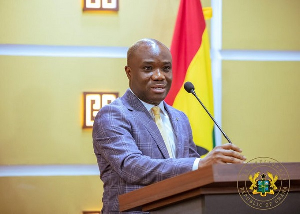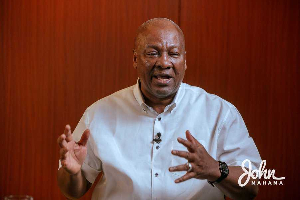.... the Supreme Court for Sure!!
I read with grave concern, Kwesi Pratt's outburst against the Chief Justice of Ghana. While I believe Kwesi Pratt has the right to question an administrative decision by the Chief Justice, I think he is wrong in asserting that the Chief Justice is not above the Supreme Court on administrative matters. Not only is he wrong, he is misinforming the public and fanning the flames of political tension by oozing misguided and uninformed surd. Here, I quote the constitution to make my case. Chapter 11, Article 125 (4) states unequivocally that, "The chief Justice shall, subject to this constitution, be the head of the Judiciary and shall be responsible for the administration and supervision of the Judiciary." I am not sure if the constitution can be any clearer. Not only is the Chief Justice above all justices in Ghana, he or she has a responsibility to supervise and administer the judiciary.
A simple analogy may help here. The Chief Justice is the CEO of the judiciary. She can, in the interest of Ghana, exercise her administrative discretion to override any administrative decision(s) pertaining to the Judiciary. She will be held responsible for any administrative failures of the Judiciary. Liken the Supreme Court Justices to a bunch of regional Vice Presidents of a business, charged with helping to shape an administrative decision. Is Kwesi Pratt saying that the CEO cannot override the regional Vice Presidents? Kwesi has to be mindful of his utterances. Saying a lot and not saying much tends to devalue one's contribution. In any human situation that I am aware of, there is either a person or group that has the final say. In the judiciary, the buck stops with the Chief Justice on all administrative matters. With ultimate responsibility, comes final decision authority.
The chief Justice has two basic responsibilities, among others. These responsibilities are Administrative and Judicial. Here, in the case of whether to use cameras or not, her decision is purely administrative. This is not a judicial or legal matter. At no point does this administrative matter morph into a legal matter. There is absolutely no need for judicial review on this matter. None! We must not create imaginary issues when there is no substantive issue. The constitution grants the CJ final authority on administrative matters pertaining to the judiciary. So where does the all knowing Kwesi Pratt get off admonishing and chiding the Chief Justice? Other Justices are free to debate administrative decisions all day, month and year. Any decision they make is subject to the approval of the Chief Justice. When the time to draw the line is upon the judiciary, the Chief Justice has the final and ultimate say. On a matter of this magnitude, where the validity of an election is on the line, I don’t see why she can’t weigh in. Yes she can!
I think reasonable people can debate on how the Chief Justice exercises administrative authority and power, conferred by the constitution. However, this debate must recognize that the CJ has a lot of discretion as to how he or she exercises this authority. The CJ may choose to be collaborative, consensus-driven, voting inspired or go it alone on administrative matters. All the above are acceptable decision making models. The process leading to the decision is purely at the discretion of the CJ. However, the final decision and authority lies squarely with the CJ. The CJ can opt to have other Supreme Court Justices weigh in. Indeed, some of us would prefer a collaborative win/win approach in making such administrative decisions. Involving other Supreme Court Justices in administrative decision making does not diminish or vacate the CJ's ultimate and overriding administrative power and responsibility.
Indeed, the CJ, should he or she choose to use the collaborative model, is duty bound to manage the expectation of the Supreme Court Justices. It is worth noting, that, it is truly acceptable to contribute to a discussion without having the right or power to make the final decision. The key here is to manage expectations, define the role of contributors and be clear about who has final decision making authority. There is no doubt that the CJ has the final say on administrative matters pertaining to the judiciary. The CJ had the discretion of either accepting the decision of the Supreme Court Justices or overriding it. I am glad she did override it.
My friends, what makes Kwesi Pratt's outburst additionally distasteful, is that, the CJ is onto something here. I think she is setting a precedent that stands to benefit Ghana in the long run. She is, in effect, raising the roof on the constitutional provision and standard (chapter 11, Article 125 (2)), that allows the people to come into their courtroom. Not everyone can physically be present in the courtroom. Transparency, we all know, helps put a dent in corruption. Lastly, an informed populace is a huge asset to the country’s democracy and peaceful atmosphere. So, what is Kwesi's beef with giving the people a front row seat to their courtroom, especially if it relives pressure in the country? Yes, cameras in the courtroom could affect productivity but this concern is offset by the glaring benefits. These conservative judges who continue to rile against the CJ's decision ought to know that they are merely caretakers of the people's courtroom. They need not choose arrogance, self preservation, the cloak of secrecy and mystery, over the need of the people to know, firsthand, what goes on in their courtroom.
So, I end by asserting unequivocally, that, the CJ is above all Justices on administrative matters pertaining to the Judiciary. She has solid constitutional backing. And yes, her decision to put cameras in the courtroom is a fine one. Televising court proceedings on such a high profile case is the right thing to do. I don't believe that televising the case will affect its outcome. If anything, it will expose the backwardness of our conservative Supreme Court justices. In the long run, Ghana will be better off with cameras in most, if not all, the Courtrooms. Cameras in the courtroom should help with the fight against corruption and the need for modernization.
Kwesi Pratt must be careful in his utterances and stop being the opportunist journalist that he is known to be. Misinforming and fomenting unnecessary kerfuffle in the country is behavior not worthy of any responsible journalist. I hope Mr. Pratt will be circumspect when commenting on sensitive issues. The least he can do is to do his homework before triggering his trademark salvos! Ghana deserves better! Bravo CJ!!
Nii Lantey Okunka Bannerman (Affectionately dubbed the double edge sword--Santrofi Anoma) I don't give them hell, I just tell the truth and they think it is hell---Harry Truman
Opinions of Thursday, 25 April 2013
Columnist: Bannerman, Nii Lantey Okunka


















